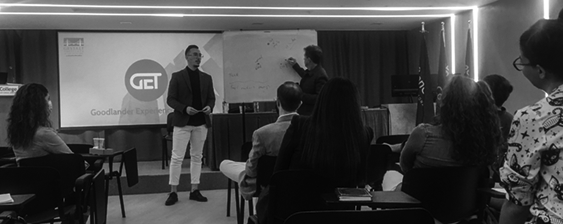

Experience Organization Practice & Theory™ (EOPT) was founded by Morgan Goodlander and expands on his previous work in gestalt and context
dynamics to form a new consciousness based, meta-experiential platfrom for human advancement. It represents a novel framework for comprehending
and engaging with the human condition and offers a comprehensive method of
exploring human experience and behavior.
At its core, EOPT is situated in an integration of existential-panpsychism and experiential-constructivism,
which emphasizes the individual's ability to make choices in the context of a fundamental layer of consciousness which gives rise to a phenomenological surround where
lived experience is organized through the soma. EOPT's defining feature is the practice of identifying the Organizations of Experience that occur within everyday
consciousness moment-to-moment and are shared somatically between individuals and groups. The theory emphasizes consciousness as the "quintessent" matrix in which experience arises,
is organized, and life finds appearance. The all pervasiveness of consciousness and its fundamental role in supporting awareness and cognition gives EOPT the most solid foundation
from which to form ideas and develop practices such as the experiential exploration of the constructive and destructive forms of aesthetics as they appear in
lived experience.
Additional guiding principles are resituated and extended in EOPT from Gestalt Therapy, Systems Theory, and Synergetics, to play a vital role in focusing on
how the holistic organization and positioning of human experience is mirrored in physical systems. They help support the EOPT view that human experience is
not merely the sum of individual elements, but instead is a fluid series of cohesive wholes unpredicted by their parts alone. EOPT is built on the integration
of proven non-reductionist observations from the past to formulate a new, contemporary understanding, of how individuals select and organize their experiences
wholistically and synergetically.
Ontology and Phenomenology, are additional cornerstones of EOPT and delve into the nature of being and existence as it appears. They encourage an exploration
of how individual's experience their being and reality, and how the organization of this experience shapes their beliefs and interactions with the world. This
aspect of EOPT advocates for a non-judgmental observation and description of one's own experiences, facilitating a deeper understanding of personal
perceptions, emotions, and consciousness. Also integral to the EOPT approach is the phenomenology of creativity, imagination, meditation and mystic experiences as
the essential features of human adaptation, survival, progress, and fulfillment.
Concepts such as Morphic Resonance, Symbiogenesis, and Auto-poetic Theory which suggest that living systems are habitual, cooperative, and self-replicating are also integrated into
EOPT to highlight the individual's capacity for growth, adaptation, transformation, and collaboration. This self-organizing aspect empowers individuals to take a comprehensive
look at how their experience organization is co-created, replicated, and made habitual between self, other, and social system.
Experience Organization Practice & Theory, therefore, offers a multi-dimensional and meta-experiential approach to understanding and engaging with the human situation.
It integrates existential insights, psychological principles, and philosophical theories to provide a unique and comprehensive perspective on how individuals
perceive, interpret, and interact with their world.